The Significance of Nursing Research in Healthcare Settings
VerifiedAdded on 2022/11/14
|6
|1401
|252
Essay
AI Summary
This essay explores the profound importance of nursing research in shaping contemporary nursing practices and education. It emphasizes how research informs healthcare practices and nursing curricula, highlighting the evolution of nursing roles and the necessity of evidence-based practice. The essay underscores the value of nursing research in improving patient care, establishing best practices, and adapting to changes in the healthcare environment. It also addresses barriers to research utilization and suggests improvements in nursing training to translate research findings into clinical practice. The essay concludes by stressing the need for nurses to appreciate and actively engage in nursing research to ensure optimal patient care and professional advancement. The role of research in evaluating and improving standards of practice is also discussed, as well as the benefits of a systematic approach to care based on evidence gathered under controlled conditions. The essay also discusses the importance of statistical nursing research and its role in helping nurses respond to changes in the healthcare environment.
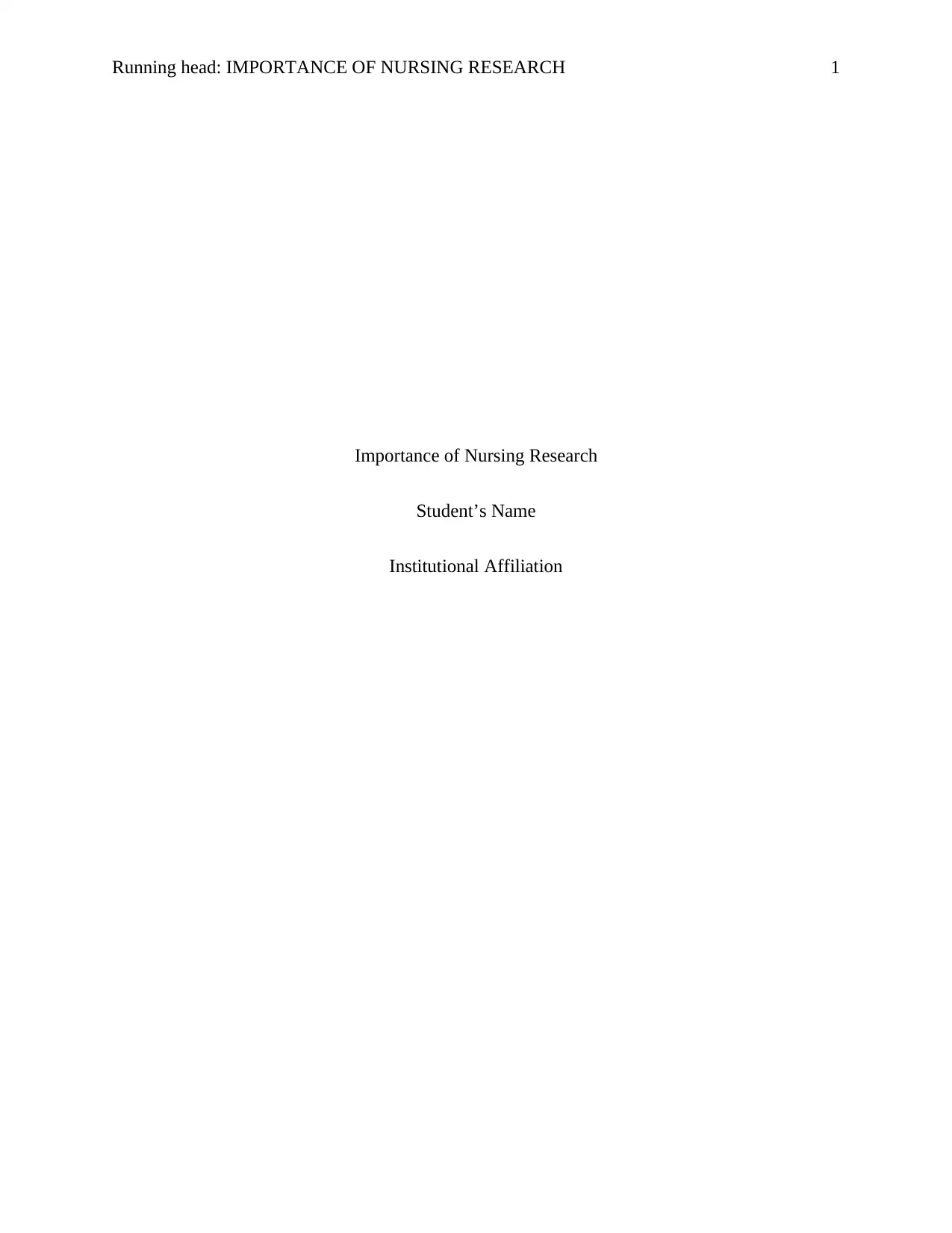
Running head: IMPORTANCE OF NURSING RESEARCH 1
Importance of Nursing Research
Student’s Name
Institutional Affiliation
Importance of Nursing Research
Student’s Name
Institutional Affiliation
Paraphrase This Document
Need a fresh take? Get an instant paraphrase of this document with our AI Paraphraser
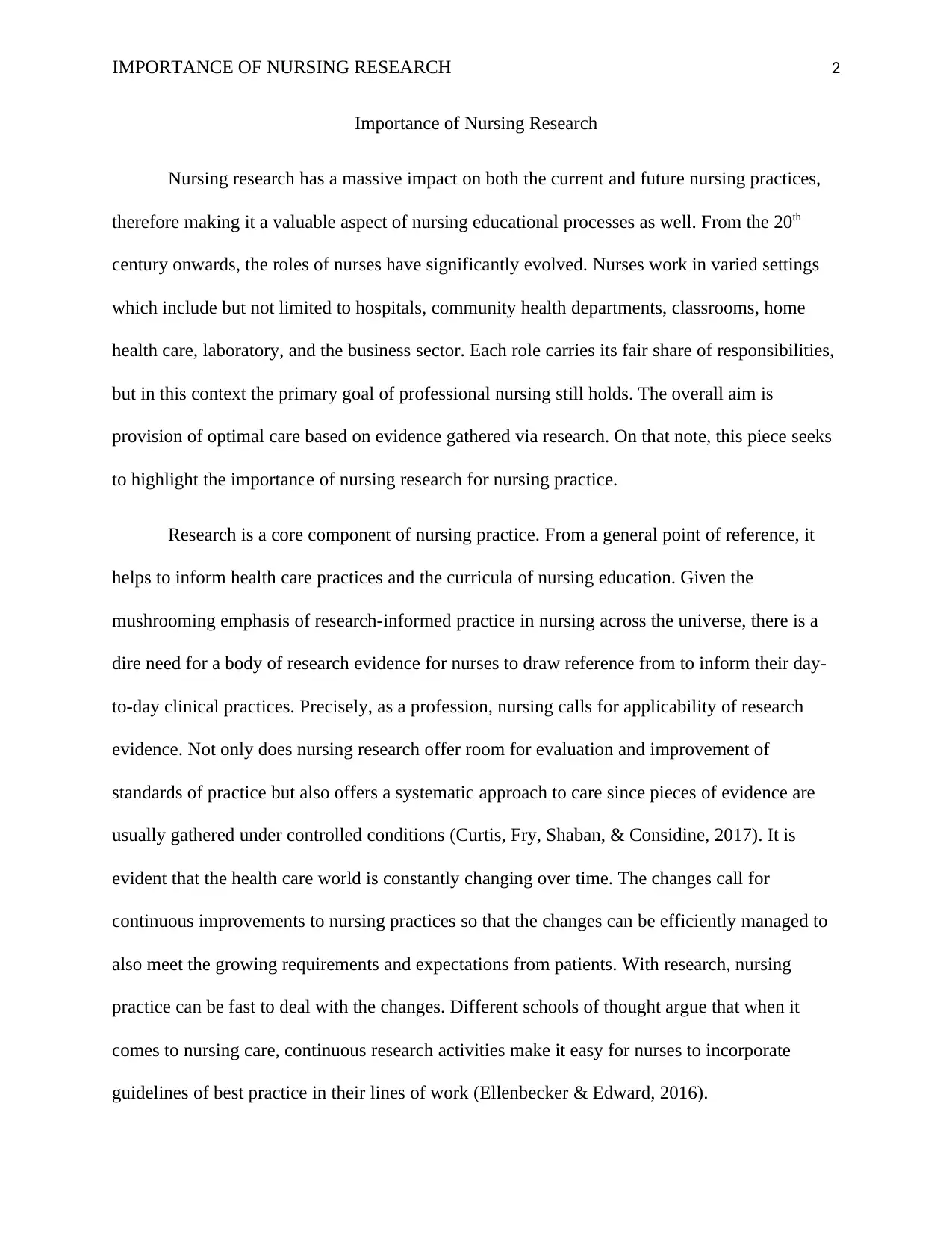
IMPORTANCE OF NURSING RESEARCH 2
Importance of Nursing Research
Nursing research has a massive impact on both the current and future nursing practices,
therefore making it a valuable aspect of nursing educational processes as well. From the 20th
century onwards, the roles of nurses have significantly evolved. Nurses work in varied settings
which include but not limited to hospitals, community health departments, classrooms, home
health care, laboratory, and the business sector. Each role carries its fair share of responsibilities,
but in this context the primary goal of professional nursing still holds. The overall aim is
provision of optimal care based on evidence gathered via research. On that note, this piece seeks
to highlight the importance of nursing research for nursing practice.
Research is a core component of nursing practice. From a general point of reference, it
helps to inform health care practices and the curricula of nursing education. Given the
mushrooming emphasis of research-informed practice in nursing across the universe, there is a
dire need for a body of research evidence for nurses to draw reference from to inform their day-
to-day clinical practices. Precisely, as a profession, nursing calls for applicability of research
evidence. Not only does nursing research offer room for evaluation and improvement of
standards of practice but also offers a systematic approach to care since pieces of evidence are
usually gathered under controlled conditions (Curtis, Fry, Shaban, & Considine, 2017). It is
evident that the health care world is constantly changing over time. The changes call for
continuous improvements to nursing practices so that the changes can be efficiently managed to
also meet the growing requirements and expectations from patients. With research, nursing
practice can be fast to deal with the changes. Different schools of thought argue that when it
comes to nursing care, continuous research activities make it easy for nurses to incorporate
guidelines of best practice in their lines of work (Ellenbecker & Edward, 2016).
Importance of Nursing Research
Nursing research has a massive impact on both the current and future nursing practices,
therefore making it a valuable aspect of nursing educational processes as well. From the 20th
century onwards, the roles of nurses have significantly evolved. Nurses work in varied settings
which include but not limited to hospitals, community health departments, classrooms, home
health care, laboratory, and the business sector. Each role carries its fair share of responsibilities,
but in this context the primary goal of professional nursing still holds. The overall aim is
provision of optimal care based on evidence gathered via research. On that note, this piece seeks
to highlight the importance of nursing research for nursing practice.
Research is a core component of nursing practice. From a general point of reference, it
helps to inform health care practices and the curricula of nursing education. Given the
mushrooming emphasis of research-informed practice in nursing across the universe, there is a
dire need for a body of research evidence for nurses to draw reference from to inform their day-
to-day clinical practices. Precisely, as a profession, nursing calls for applicability of research
evidence. Not only does nursing research offer room for evaluation and improvement of
standards of practice but also offers a systematic approach to care since pieces of evidence are
usually gathered under controlled conditions (Curtis, Fry, Shaban, & Considine, 2017). It is
evident that the health care world is constantly changing over time. The changes call for
continuous improvements to nursing practices so that the changes can be efficiently managed to
also meet the growing requirements and expectations from patients. With research, nursing
practice can be fast to deal with the changes. Different schools of thought argue that when it
comes to nursing care, continuous research activities make it easy for nurses to incorporate
guidelines of best practice in their lines of work (Ellenbecker & Edward, 2016).
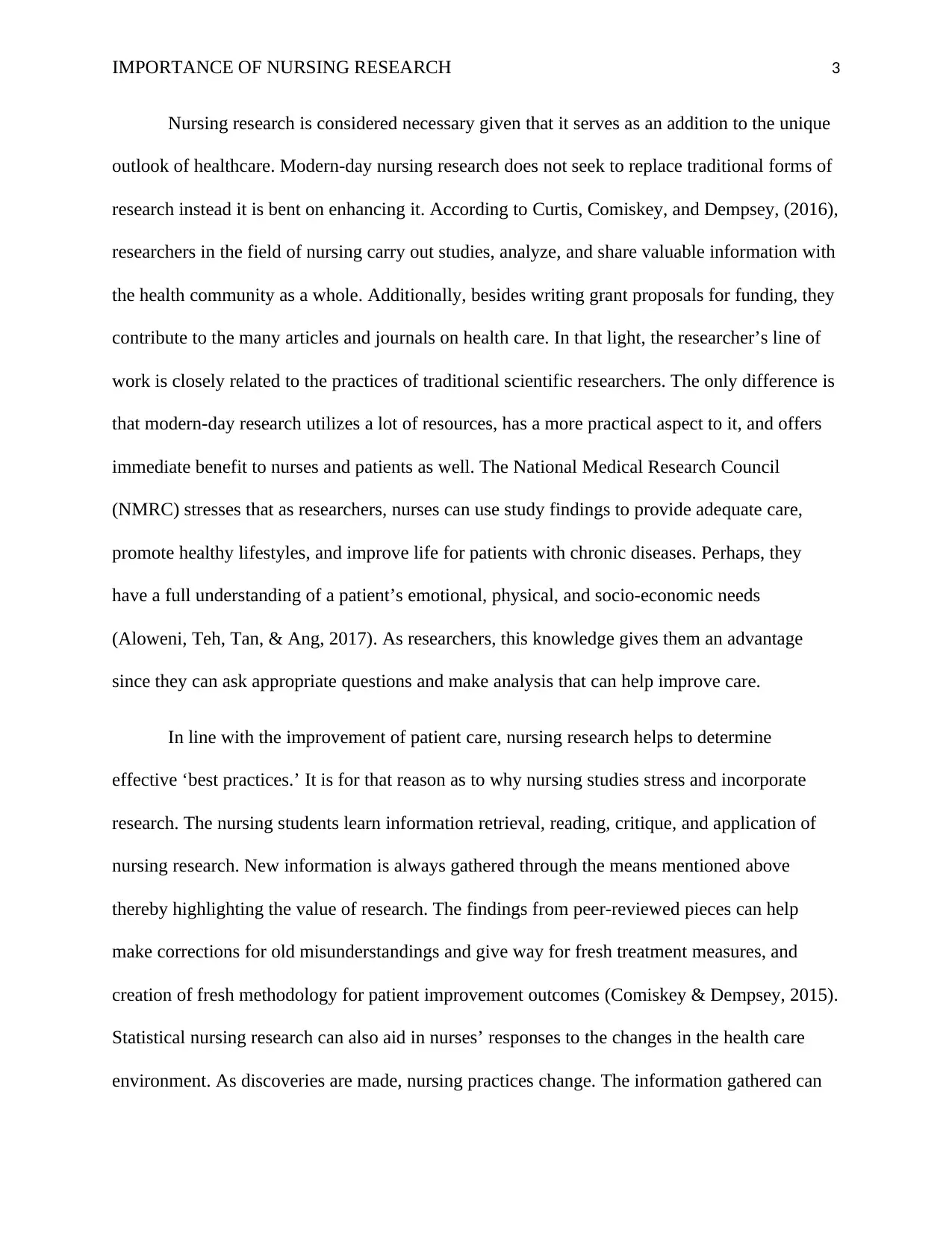
IMPORTANCE OF NURSING RESEARCH 3
Nursing research is considered necessary given that it serves as an addition to the unique
outlook of healthcare. Modern-day nursing research does not seek to replace traditional forms of
research instead it is bent on enhancing it. According to Curtis, Comiskey, and Dempsey, (2016),
researchers in the field of nursing carry out studies, analyze, and share valuable information with
the health community as a whole. Additionally, besides writing grant proposals for funding, they
contribute to the many articles and journals on health care. In that light, the researcher’s line of
work is closely related to the practices of traditional scientific researchers. The only difference is
that modern-day research utilizes a lot of resources, has a more practical aspect to it, and offers
immediate benefit to nurses and patients as well. The National Medical Research Council
(NMRC) stresses that as researchers, nurses can use study findings to provide adequate care,
promote healthy lifestyles, and improve life for patients with chronic diseases. Perhaps, they
have a full understanding of a patient’s emotional, physical, and socio-economic needs
(Aloweni, Teh, Tan, & Ang, 2017). As researchers, this knowledge gives them an advantage
since they can ask appropriate questions and make analysis that can help improve care.
In line with the improvement of patient care, nursing research helps to determine
effective ‘best practices.’ It is for that reason as to why nursing studies stress and incorporate
research. The nursing students learn information retrieval, reading, critique, and application of
nursing research. New information is always gathered through the means mentioned above
thereby highlighting the value of research. The findings from peer-reviewed pieces can help
make corrections for old misunderstandings and give way for fresh treatment measures, and
creation of fresh methodology for patient improvement outcomes (Comiskey & Dempsey, 2015).
Statistical nursing research can also aid in nurses’ responses to the changes in the health care
environment. As discoveries are made, nursing practices change. The information gathered can
Nursing research is considered necessary given that it serves as an addition to the unique
outlook of healthcare. Modern-day nursing research does not seek to replace traditional forms of
research instead it is bent on enhancing it. According to Curtis, Comiskey, and Dempsey, (2016),
researchers in the field of nursing carry out studies, analyze, and share valuable information with
the health community as a whole. Additionally, besides writing grant proposals for funding, they
contribute to the many articles and journals on health care. In that light, the researcher’s line of
work is closely related to the practices of traditional scientific researchers. The only difference is
that modern-day research utilizes a lot of resources, has a more practical aspect to it, and offers
immediate benefit to nurses and patients as well. The National Medical Research Council
(NMRC) stresses that as researchers, nurses can use study findings to provide adequate care,
promote healthy lifestyles, and improve life for patients with chronic diseases. Perhaps, they
have a full understanding of a patient’s emotional, physical, and socio-economic needs
(Aloweni, Teh, Tan, & Ang, 2017). As researchers, this knowledge gives them an advantage
since they can ask appropriate questions and make analysis that can help improve care.
In line with the improvement of patient care, nursing research helps to determine
effective ‘best practices.’ It is for that reason as to why nursing studies stress and incorporate
research. The nursing students learn information retrieval, reading, critique, and application of
nursing research. New information is always gathered through the means mentioned above
thereby highlighting the value of research. The findings from peer-reviewed pieces can help
make corrections for old misunderstandings and give way for fresh treatment measures, and
creation of fresh methodology for patient improvement outcomes (Comiskey & Dempsey, 2015).
Statistical nursing research can also aid in nurses’ responses to the changes in the health care
environment. As discoveries are made, nursing practices change. The information gathered can
⊘ This is a preview!⊘
Do you want full access?
Subscribe today to unlock all pages.

Trusted by 1+ million students worldwide
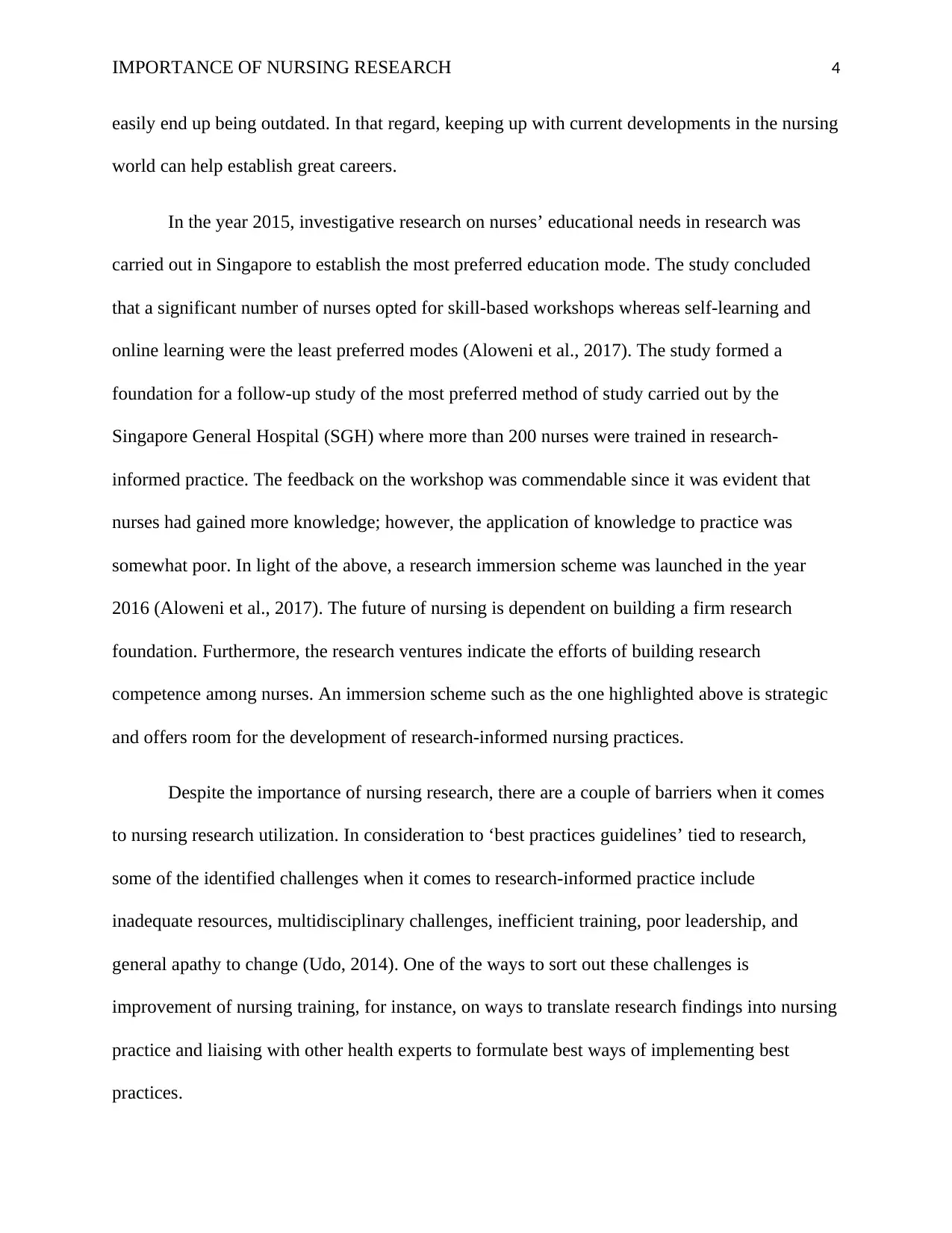
IMPORTANCE OF NURSING RESEARCH 4
easily end up being outdated. In that regard, keeping up with current developments in the nursing
world can help establish great careers.
In the year 2015, investigative research on nurses’ educational needs in research was
carried out in Singapore to establish the most preferred education mode. The study concluded
that a significant number of nurses opted for skill-based workshops whereas self-learning and
online learning were the least preferred modes (Aloweni et al., 2017). The study formed a
foundation for a follow-up study of the most preferred method of study carried out by the
Singapore General Hospital (SGH) where more than 200 nurses were trained in research-
informed practice. The feedback on the workshop was commendable since it was evident that
nurses had gained more knowledge; however, the application of knowledge to practice was
somewhat poor. In light of the above, a research immersion scheme was launched in the year
2016 (Aloweni et al., 2017). The future of nursing is dependent on building a firm research
foundation. Furthermore, the research ventures indicate the efforts of building research
competence among nurses. An immersion scheme such as the one highlighted above is strategic
and offers room for the development of research-informed nursing practices.
Despite the importance of nursing research, there are a couple of barriers when it comes
to nursing research utilization. In consideration to ‘best practices guidelines’ tied to research,
some of the identified challenges when it comes to research-informed practice include
inadequate resources, multidisciplinary challenges, inefficient training, poor leadership, and
general apathy to change (Udo, 2014). One of the ways to sort out these challenges is
improvement of nursing training, for instance, on ways to translate research findings into nursing
practice and liaising with other health experts to formulate best ways of implementing best
practices.
easily end up being outdated. In that regard, keeping up with current developments in the nursing
world can help establish great careers.
In the year 2015, investigative research on nurses’ educational needs in research was
carried out in Singapore to establish the most preferred education mode. The study concluded
that a significant number of nurses opted for skill-based workshops whereas self-learning and
online learning were the least preferred modes (Aloweni et al., 2017). The study formed a
foundation for a follow-up study of the most preferred method of study carried out by the
Singapore General Hospital (SGH) where more than 200 nurses were trained in research-
informed practice. The feedback on the workshop was commendable since it was evident that
nurses had gained more knowledge; however, the application of knowledge to practice was
somewhat poor. In light of the above, a research immersion scheme was launched in the year
2016 (Aloweni et al., 2017). The future of nursing is dependent on building a firm research
foundation. Furthermore, the research ventures indicate the efforts of building research
competence among nurses. An immersion scheme such as the one highlighted above is strategic
and offers room for the development of research-informed nursing practices.
Despite the importance of nursing research, there are a couple of barriers when it comes
to nursing research utilization. In consideration to ‘best practices guidelines’ tied to research,
some of the identified challenges when it comes to research-informed practice include
inadequate resources, multidisciplinary challenges, inefficient training, poor leadership, and
general apathy to change (Udo, 2014). One of the ways to sort out these challenges is
improvement of nursing training, for instance, on ways to translate research findings into nursing
practice and liaising with other health experts to formulate best ways of implementing best
practices.
Paraphrase This Document
Need a fresh take? Get an instant paraphrase of this document with our AI Paraphraser
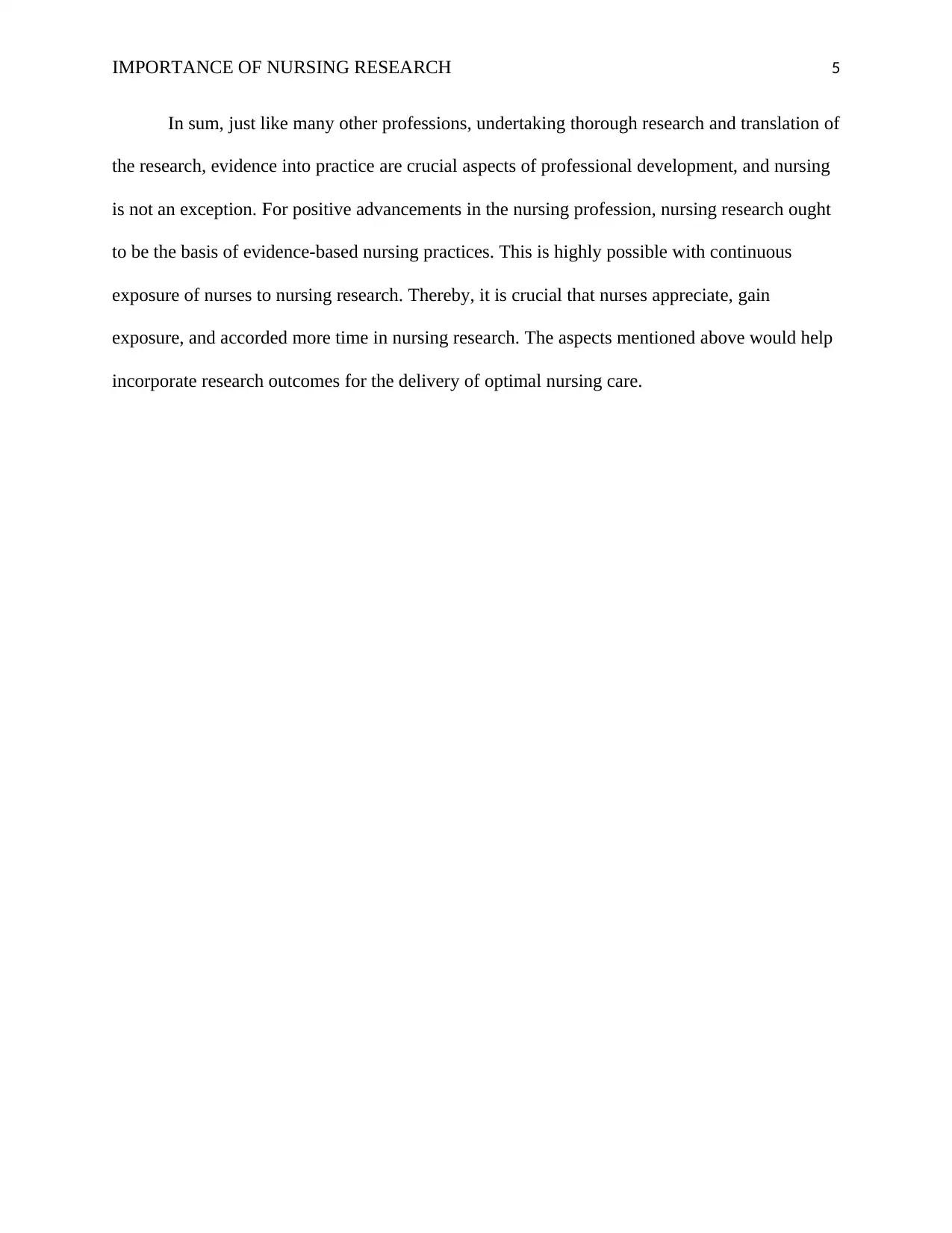
IMPORTANCE OF NURSING RESEARCH 5
In sum, just like many other professions, undertaking thorough research and translation of
the research, evidence into practice are crucial aspects of professional development, and nursing
is not an exception. For positive advancements in the nursing profession, nursing research ought
to be the basis of evidence-based nursing practices. This is highly possible with continuous
exposure of nurses to nursing research. Thereby, it is crucial that nurses appreciate, gain
exposure, and accorded more time in nursing research. The aspects mentioned above would help
incorporate research outcomes for the delivery of optimal nursing care.
In sum, just like many other professions, undertaking thorough research and translation of
the research, evidence into practice are crucial aspects of professional development, and nursing
is not an exception. For positive advancements in the nursing profession, nursing research ought
to be the basis of evidence-based nursing practices. This is highly possible with continuous
exposure of nurses to nursing research. Thereby, it is crucial that nurses appreciate, gain
exposure, and accorded more time in nursing research. The aspects mentioned above would help
incorporate research outcomes for the delivery of optimal nursing care.
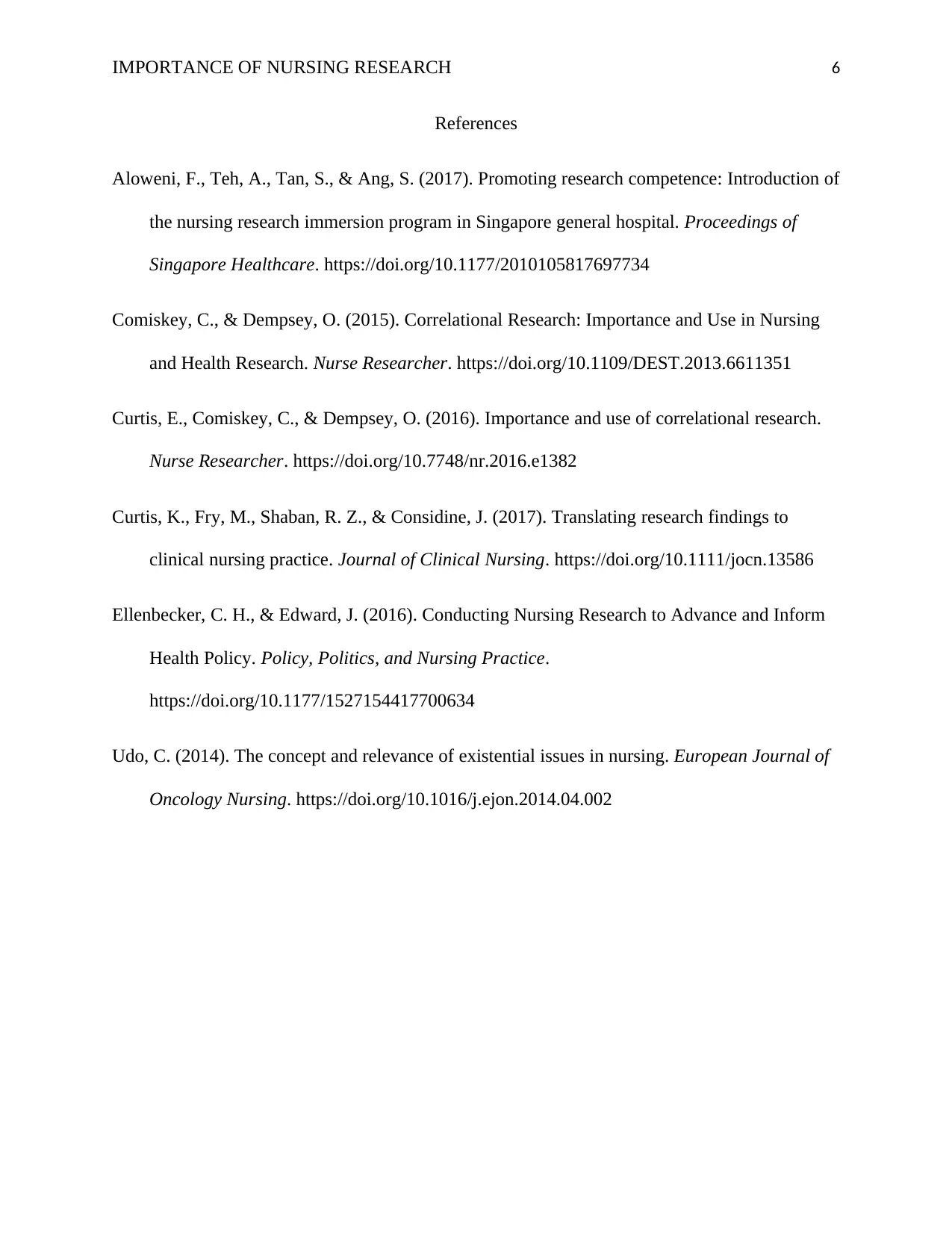
IMPORTANCE OF NURSING RESEARCH 6
References
Aloweni, F., Teh, A., Tan, S., & Ang, S. (2017). Promoting research competence: Introduction of
the nursing research immersion program in Singapore general hospital. Proceedings of
Singapore Healthcare. https://doi.org/10.1177/2010105817697734
Comiskey, C., & Dempsey, O. (2015). Correlational Research: Importance and Use in Nursing
and Health Research. Nurse Researcher. https://doi.org/10.1109/DEST.2013.6611351
Curtis, E., Comiskey, C., & Dempsey, O. (2016). Importance and use of correlational research.
Nurse Researcher. https://doi.org/10.7748/nr.2016.e1382
Curtis, K., Fry, M., Shaban, R. Z., & Considine, J. (2017). Translating research findings to
clinical nursing practice. Journal of Clinical Nursing. https://doi.org/10.1111/jocn.13586
Ellenbecker, C. H., & Edward, J. (2016). Conducting Nursing Research to Advance and Inform
Health Policy. Policy, Politics, and Nursing Practice.
https://doi.org/10.1177/1527154417700634
Udo, C. (2014). The concept and relevance of existential issues in nursing. European Journal of
Oncology Nursing. https://doi.org/10.1016/j.ejon.2014.04.002
References
Aloweni, F., Teh, A., Tan, S., & Ang, S. (2017). Promoting research competence: Introduction of
the nursing research immersion program in Singapore general hospital. Proceedings of
Singapore Healthcare. https://doi.org/10.1177/2010105817697734
Comiskey, C., & Dempsey, O. (2015). Correlational Research: Importance and Use in Nursing
and Health Research. Nurse Researcher. https://doi.org/10.1109/DEST.2013.6611351
Curtis, E., Comiskey, C., & Dempsey, O. (2016). Importance and use of correlational research.
Nurse Researcher. https://doi.org/10.7748/nr.2016.e1382
Curtis, K., Fry, M., Shaban, R. Z., & Considine, J. (2017). Translating research findings to
clinical nursing practice. Journal of Clinical Nursing. https://doi.org/10.1111/jocn.13586
Ellenbecker, C. H., & Edward, J. (2016). Conducting Nursing Research to Advance and Inform
Health Policy. Policy, Politics, and Nursing Practice.
https://doi.org/10.1177/1527154417700634
Udo, C. (2014). The concept and relevance of existential issues in nursing. European Journal of
Oncology Nursing. https://doi.org/10.1016/j.ejon.2014.04.002
⊘ This is a preview!⊘
Do you want full access?
Subscribe today to unlock all pages.

Trusted by 1+ million students worldwide
1 out of 6
Related Documents
Your All-in-One AI-Powered Toolkit for Academic Success.
+13062052269
info@desklib.com
Available 24*7 on WhatsApp / Email
![[object Object]](/_next/static/media/star-bottom.7253800d.svg)
Unlock your academic potential
Copyright © 2020–2026 A2Z Services. All Rights Reserved. Developed and managed by ZUCOL.




